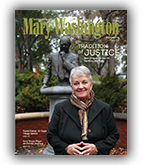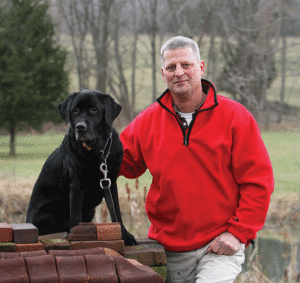The house had burned to the ground, and its embers still smoldered. Fire investigator David Doehler ’02 and Cadet worked the perimeter, but the Labrador’s well-trained nose detected no trace of accelerant. To himself, Doehler thought, probably not arson.
But the next day, when the debris had cooled, they returned for a closer sniff at the foundation. This time, Cadet calmly sat down at the threshold, alerting Doehler that he’d picked up the odor of a flammable liquid. Tests of samples from the site proved that the fire had indeed been set, and the perpetrator was arrested and convicted.
That was just one of many fire scenes Doehler and Cadet worked between 2004 and ’09 as the first dog-and-handler accelerant-detection team for the Prince William County Department of Fire and Rescue.
Doehler, who earned a bachelor of liberal studies degree, had been a firefighter for 18 years and an investigator for another eight when he got the chance to work with an accelerant-detection dog. He was matched with Cadet in Front Royal, Va., where the Bureau of Alcohol, Tobacco, Firearms, and Explosives trains Labrador retrievers for arson investigation and explosives detection.
Trained dog-and-handler teams are frequently called on to investigate fires in other jurisdictions. Doehler and his Labrador partner examined more than 250 fire scenes throughout Northern Virginia, and many of those turned out to be arson cases.
“Arson happens more often than you think,” Doehler said. But it can be difficult to prove. “In most crime scenes, evidence is left behind,” he said. “In fires, evidence is destroyed.”
A trained dog can smell far more than an investigator can see, and once a dog detects an accelerant, evidence can be tested for chemical composition. The dogs aren’t court witnesses – that part is up to the handler. Attorneys may try to discredit a dog, but Cadet always scored 100 percent on his recertification exams and was never challenged. “This was an exceptional dog,” Doehler said.
Human participants in ATF training programs are encouraged to adopt their dogs and keep them for the rest of their lives, which Doehler was happy to do. He retired in 2009 as a captain and assistant fire marshal, and Cadet retired with him.
Cadet enjoys rural life in the Shenandoah Valley with Doehler, wife Andrea Hoover Doehler ’90, daughter Madison, and son Benjamin. At 12, Cadet is the elder statesman of the Doehlers’ animals, including two other dogs, cats, goats, chickens, guinea fowl, and a peacock.
“Arson happens more often than you think.” But it can be difficult to prove. “In most crime scenes, evidence is left behind. In fires, evidence is destroyed.” – David Doehler
Doehler, however, wasn’t ready to quit working. Now 55, he is a contract trainer at the ATF facility where he got Cadet.
It’s a career he prepared for in part by earning a degree from UMW – still Mary Washington College when he started the program in the early 1990s. Demands of work and parenthood allowed him to take just a course at a time, but his faculty mentor, Professor of Earth and Environmental Sciences Michael Bass, “went above and beyond” to keep him on track, Doehler said. “And a decade later, I graduated.”
With two alumni parents, daughter Madison checked out the campus as part of her college search. Right away, UMW went to the top of her list. A high school senior, she was excited to be offered early acceptance to the class of 2018.

